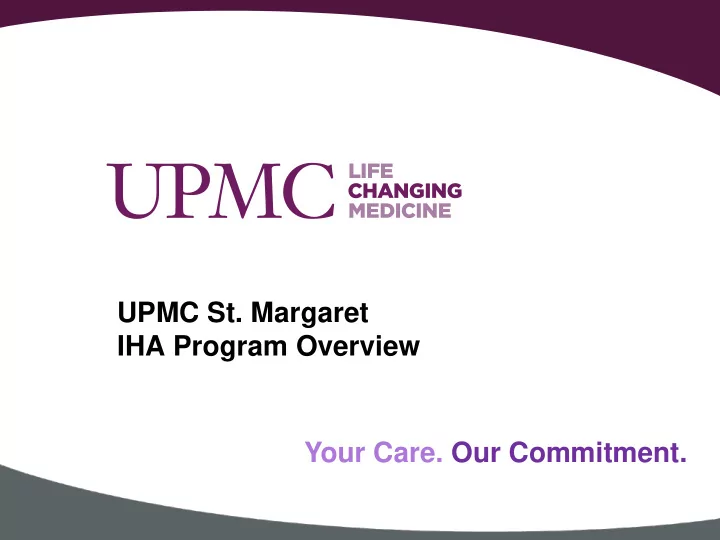

UPMC St. Margaret IHA Program Overview Your Care. Our Commitment.
IHA Program “In - House Administrator” • What is it? – Successful initiative at UPMC Mercy: “MOD: Manager on Duty” – Presence of a management level person 7 days per week on the off shift (1-9pm Mon – Fri and 9a -3:30p Sat/Sun) No holidays/holiday weekends • Why was it started at Mercy? Why is it right for us? – Awareness that during the busiest times of the day (off shift and weekends) there is very little management presence – AOD (Clin. Coord.) had the responsibility for the entire house alone during the busiest hours – Front line staff had limited ability to interact with management on the off shift • Who participates: – Executive Management Group/Directors 2
IHA Core Responsibilities • • Check in with Clin. Coord. for Round in Ancillary Depts. report (Radiology, Lab, Pharmacy etc) – Staffing issues – Patient Relations issues • Visit waiting rooms – NEDOCS level • Support Clin. Coord. with – PACU/Med Unit status patient / family issues and • Round in ED other tasks as needed • Round in PACU / Med Unit / • Identify patient satisfaction Short Stay opportunities/successes • Round on all inpatient floors • Interact with staff – what can – Connect with staff we do to help? – What is needed to support? • Evaluate facility/environment – Reinforce initiatives (e.g. AIDET, needs and address when Nite Cap) possible 3
IHA Information • The IHA will have a designated phone number x4488 with a Pickle phone housed in the Clinical Coordinator’s office • A binder will also be kept in the Clin. Coord’s office with meal vouchers, drink tickets, parking exit tickets, and a list with frequently used phone numbers and contacts. • During the assigned IHA hours, leaders are asked to dedicate that time solely to the IHA role, and not perform their individual work during that time. • If a patient complaint is taken, it should be documented on the SMH Complaint Form. Concerns and service facilitations can be documented on the IHA checklist. 4
Wins Reported at UPMC Mercy • • Staff MODs – Early skepticism replaced with – Opens entire new world to non- welcoming - MODs are viewed clinical leadership, tremendous as a resource and not the learning experience “police” – New skills developed (patient / – Ability to have face to face family interactions, difficult interaction with leadership conversations) – Ability to ask questions to non- – Frequent interaction with families clinical staff they rarely interact and visitors with (HR, Dietary, Pharmacy, – Rounding allows for ongoing President, CFO etc) facility/environment observation – Quick escalation of problems for – Assist with spread of new resolution in real time initiatives by supporting these on – Frees AODs up to concentrate the off shift on clinical issues – Real time feedback loop with nightly summary email 5
Next Steps • Program to begin November 1, 2011 • Review the proposed schedule and make the necessary changes/swaps, changes are to be sent to Elaine Panza. • Clinical Coordinators feedback • Communication in inside Extra and e-mail blast • Re-Evaluate program after two months and possibly expand/decrease the IHA roster in the future Your Care. Our Commitment. 6
Recommend
More recommend